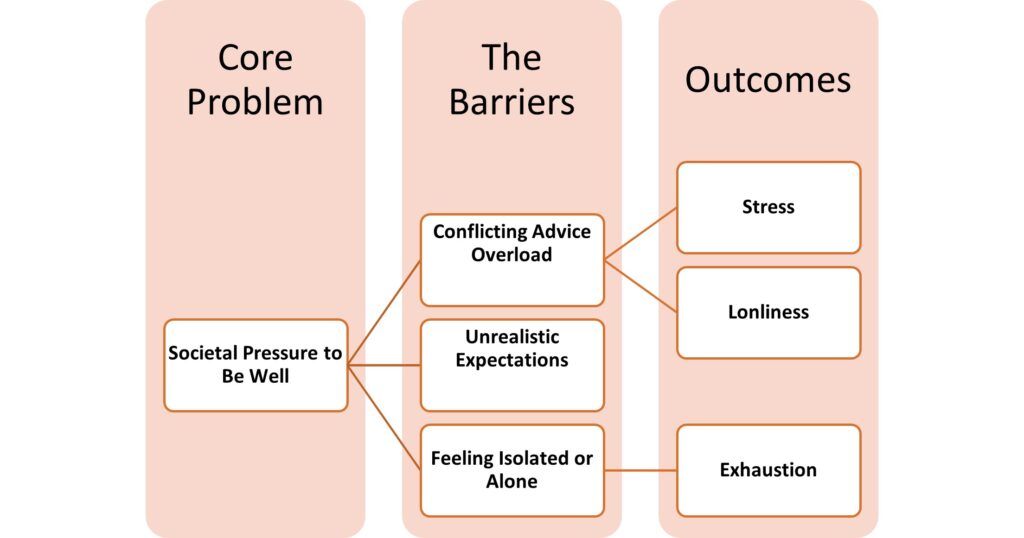
When Wellbeing Becomes a Weight:
Breaking Free from the Pressure to Be Well
In a world that constantly boasts self-care, fitness, and mental wellness, you would think we’d all be thriving. Yet, for many of us, it is this relentless pursuit of wellbeing that’s causing the very opposite: burnout, exhaustion, and this odd sense of being stuck. According to Lululemon’s 2024 Global Wellbeing Report, the pressure we feel to “be well” is inversely proportional to our own feelings of actually being well.

Let’s peek into how this cycle is played out and, most importantly, how we can break free.
The Wellbeing Paradox
On paper, prioritizing wellbeing might seem like a forward step. Who doesn’t dream of feeling the physical manifestations of strength, mental readiness, and social connection? But as the report puts it:
-
- Nearly 2 in 3 people feel pressured by societal expectations to look or act “well.”
- 45% of people are burned out—physical, emotional, or social exhaustion brought on by chronic pressure.
- A shocking 89% of people with burnout cite loneliness as a significant contributor to their challenges.
These statistics speak to a painful fact: trying so hard to live up to the external expectations that define wellbeing is precisely what leaves us depleted and emotionally spent.
Three Reasons Wellbeing Feels Unattainable
-
- Overwhelming Expectations
We all seem to carry the burden of “looking” healthy, happy, and balanced. Social media feeds this delusion with highlight reels of perfect meals, faultless workouts, and serene moments of self-care. The result? 61 % of people reported feeling crushed by societal standards, making little room for authenticity or imperfection.
-
- Conflicting Advice Overload
Should we meditate, or exercise? Keto or plant-based? Jog or do yoga? 53% of people suffer from information-overload overload, feeling bombarded by sheer numbers of tips on how to “better” our wellbeing. Rather than being empowered, many of us end up stuck in limbo, feeling we don’t know where to begin.
-
- Going It Alone
The quest for wellness often feels lonely. Most of us don’t have the support we need, and loneliness amplifies the problem. Burnout thrives when we don’t feel part of a caring, connected community.
The Emotional Cost of Trying Too Hard
Burnout from wellbeing efforts doesn’t just affect our bodies—it seeps into our emotions:
-
- 8 in 10 people with burnout regularly experience stress, exhaustion, and loneliness.
- The constant push to “improve” leaves us feeling stuck, powerless, and maybe even less capable of meaningful change.
It’s time to give up on some impossible ideal and start doing what truly makes us feel good about ourselves.
How to Break the Cycle
The Lululemon report highlights a few powerful strategies to help reclaim wellbeing on our own terms:
-
- Quiet the Noise
Take digital detox or take a step back from social comparison. People who disengage report having 9% higher wellbeing.
-
- Boundary Setting
Learn to say no or learn to prioritise what’s important to you. Protect your time. A simple boundary-setting increases wellbeing by up to 13%.
-
- The Power of Small Steps
Wellbeing is not an all-or-nothing proposition. Wellbeing increases by up to 16% from short walks, moments of gratitude, or even from just stretching for a few minutes.
-
- Meaningful relationships are built
These individuals are 28% more likely to experience a sense of purpose and feel far less like they are experiencing burnout.
A New Path Forward
The pressure to “be well” isn’t going away, but we can change how we respond to it. Wellbeing isn’t about checking off boxes or meeting society’s expectations. It’s about finding what feels right for you—small, intentional choices that support your body, mind, and relationships.
Remember: it’s okay to be a work in progress. Just take your time, ask for help when you need it, focus on things that bring you joy, and celebrate and remember that you don’t have to do everything. Each small step toward balance and connection is meaningful—and that’s enough.
By rethinking how we approach wellness, we can finally escape the cycle of burnout and embrace a life where “being well” feels good again.



